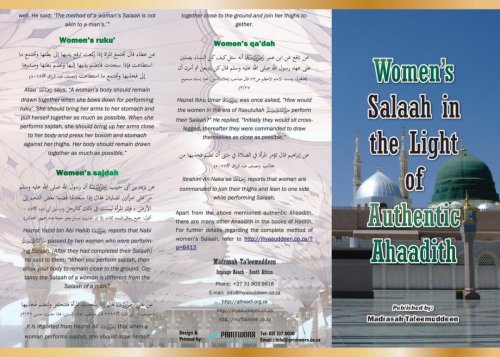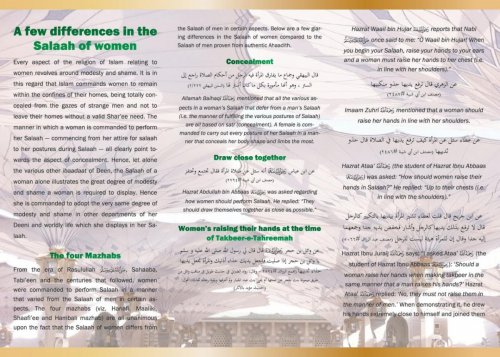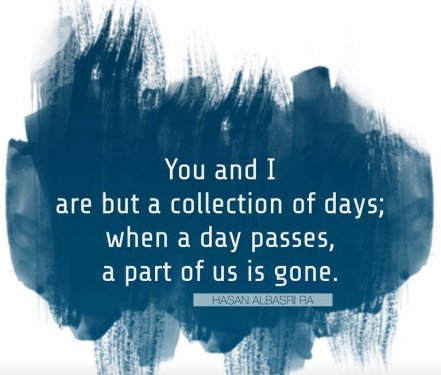-
Posts
8,434 -
Joined
-
Days Won
771
Content Type
Profiles
Forums
Events
Everything posted by ummtaalib
-

Is Prayer Of Men And Women The Same In Saheeh Bukhari?
ummtaalib replied to ColonelHardstone's topic in Hanafi Fiqh (Women)
(Click on pictures to enlarge) Salaah of Women in the Light of the Sunnah Published by: Madrasah Taleemuddeen Allah Ta'ala is the Guardian of His Deen and He alone will protect it till the last day. As a means, in every era Allah Ta'ala used the Ulama-e-Haq and His true servants to dispel any confusion and deviation from any quarter. Thus over the centuries despite the many attacks on Deen by the deviant groups, by means of the tireless efforts of the Ulama-e-Haq Allah Ta'ala has preserved the Deen in its pristine purity. This will Insha Allah continue till Qiyaamah. This treatise has been prepared to dispel the myth that the mazahib of the four Imaams of fiqh (viz. Imaam Abu Hanifa, Imaam Maalik, Imaam Shafi'ee and Imaam Ahmad bin Hambal [Rahimahumullah]) are not based on sound proofs from the sources of Shari'ah, viz the Qur'an, Sunnah, Ijma' and Qiyaas, in particular with regard to the Salaah of females. Women's Salaah Book.pdf Salah of Men and Women - The Differences In The Prayer Mufti Muhammad Yusuf Danka Croydon Masjid & Islamic Centre Salah_of_Men_and_Women The_Differences_In_The_Prayer_.pdf "The Salaah of a Believer in the Qur'an & Sunnah" by Shaykh Abu Yususf Riyadhul Haqq: http://www.scribd.com/doc/39060492/The-Salah-of-a-Beleiver-in-the-Quran-Sunnah-by-Sheikh-Abu-Yusuf-Riyadh-Ul-Haq Differences in Salah between Men and Women: According to evidences The following is a short work on the differences in Salah between men and women according to proof texts (dala’il) from the Hadith literature as well as the scholastic views of classical Sunni scholars of the past . It contains a direct reply to the claims of modern day Salafism and its figure heads like the late Ibn Baz (d. 1999) and Nasir al-Albani (d. 1999). The keen reader may also obtain the following books for a lengthier treatment on this subject with regards to Women’s prayer specifically: READ MORE HERE..... READ BOOK ONLINE The keen reader may also obtain the following books for a lengthier treatment on this subject with regards to Women’s prayer specifically: -

Sayyidina Umar (RA) - A Glimpse into his Life
ummtaalib replied to ummtaalib's topic in Prophets, History & Biographies
-
-
-
Definitions In Islamic jurisprudence there are two words used for the law of inheritance, they are Al-Miraath (المیراث ) and Al-Faraidh (الفراءض). The latter is more frequently used by the Muslim Jurists than the former. ‘Al-Miraath’ is derived from the verb ‘waratha’ ورث which means to inherit anything. Another literal meaning of the word miraath is that, it connotes the handing over of a thing from one person to another. And the word Al-Faraidh is plural of Al-Faridha الفریضة which is derived from the verb Faradha (فرض) , which literally mean “a fixed share”. In the legal terminology, it is a knowledge about some rules of the Shari’ah which guide us who will inherit and who will not and what shares will go to the heirs from the property of the deceased.
-
-
-
Importance of Inheritance in Islam Death is inevitable! And as in all aspects, Islam teaches us how to deal with the wealth left behind by the deceased. Qur'an and Sunnah on Islamic Inheritance Islamic laws of distribution of inheritance comprise one of the most important areas of Islamic jurisprudence. The rules and regulations around inheritance have been categorically set out in both the Holy Qur’an and the Sunnah of the Holy Prophet (sallallaahu 'alayhi wa sallam). In the Holy Qur’an, Surah Al-Nisa’a verses 11, 12 and 176 clearly explain the shares of almost all the legal heirs of the deceased and the Sunnah of the Holy Prophet (sallallahu 'alayhi wa sallam) further explains those shares. Regarding the importance of inheritance and the importance of learning and teaching Islamic inheritance, it is mentioned in many Ahaadith of beloved Prophet (sallallaahu 'alayhi wa sallam): "Learn (the knowledge of) inheritance and teach it (to the people) for it is half of knowledge; and it will eventually be forgotten. It will the first (knowledge) to be taken away from my Ummah" [ibn Maajah] "Indeed I am a man who will be taken away, therefore learn Fara-idh and teach it. The time of the disappearance of knowledge will come close, when two persons will dispute regarding an Islamic ruling and they will find no one to decide the dispute.” The leader of the faithful and the great companion of our Prophet, Umar radhiyallaahu 'anhu used to say, “O people, learn Fara-idh with the same concern and effort with which you learn from the Qur'an.” It is also reported that he used to say, “O Muslims, learn Fara-idh, it is an essential part of the knowledge of your religion.” Unfortunately, nowadays many of us are neglectful or simply unaware about the importance of Islamic inheritance. People have become indifferent to the Islamic system of inheritance system and the property left by the deceased Muslim is not divided among heirs according to Islamic Law. The wrong practice of negligence of women in inheritance is rapidly growing in Muslim society. InshaAllah, to raise awareness and link others to valuable information, we intend to compile basic information about the Islamic laws of inheritance. Some topics we hope to cover include: * the basics of inheritance - what it is and how it is distributed; * who can and cannot inherit; and * the rights of women and orphans. Insha'Allah, for ease of understanding we intend to start with short and concise posts, followed by posts containing more in-depth information. ~~~ Important Note: due to the complex nature of Islamic laws of inheritance, upon the death of any family member, readers are strongly advised to consult competent scholars of Islam with specific knowledge in Islamic laws of inheritance. ~~~
-
TABLE OF CONTENTS 1. Table of Contents 2. Introduction 3. Definitions 4. Inheritance in Pre-Islamic Arab 5. Warnings against Violation of the Laws of Inheritance 6. The Estate of the Deceased 7. Women and Inheritance - introduction 8. Women and Inheritance - How Islam Protects the Inheritance of the Wife 9. Women and inheritance - The Importance of Dowry 10. Women and Inheritance - Are Women Denied Equality? 11. Al-Wasiyyah (Bequest/Will) 12. An Introduction to Inheritance in Islam 13. Your Will - A Final act or Defiance or Obedience 14. Guidlines on preparing a Will and Testament Islamically 15. Islamic Will (According to English Law) 16. Registering an Islamic in Canada 17. Orphans and Inheritance 18. Further Information 19. Final Note 20. (and onwards) Comments and additional contributions 21. Guidelines on Preparing a will and testament Islamically
-
wa'alaykumus salaam What our respected Shaykh is saying is actually very helpful. If we are used to fasting in summer then it will be easier in Ramadhaan next year as fasts will be in summer for a good few years now. I know many of us found it hard this year, specially the young in schools and those at work because it was very hot and days were long.
-
“We need to get used to fasting and develop an appreciation for it. There was a time when one would see people with the signs on their faces that they had been fasting and spending long hours of the night standing in salāh. However these attributes are no longer visible. Indifference is widespread today; people do not give importance to these things any more. We should make ourselves accustomed to fasting outside of Ramadān. To do this, first start observing the masnūn fasts that fall on special occasions throughout the year, e.g. the six fast of Shawwāl, the fasts of Muharram and the fasts of Dhul Hijjah. Thereafter, start fasting on ayyām-al-bīd, i.e the 13th, 14th and 15th of every Islamic month, which was a sunnah of Rasūlullāh sallallāhu ‘alayhi wasallam. The next stage is to fast on every Monday and Thursday which is also a sunnah of Rasūlullāh sallallāhu ‘alayhi wasallam.” Shaykh Muhammad Saleem Dhorat hafizahullah www.shaykh.org
-
A bad habit is any bad activity that a person has adapted to or has become accustomed to. Some of the many activities which are quite commonly referred to as bad habits are smoking, doing drugs, drinking alcohol, lying, and stealing. People often adapt to bad habits, which is something that a person should never do. Bad habits are things which a person should always stay away from and are things which a person should keep their kids away from. Why to keep your teen kids away from bad habits? Keeping their kids away from bad habit is sort of embedded into every parent’s mind. However, have you ever wondered why you need to keep your teen kids away from bad habits? The reason why parents need to keep their teen kids away from bad habits is not only the fact that bad habits are bad and, in most cases, illegal. The reason why parents need to keep their teen kids away from bad habits is the fact that teenagers have been found to be more prone to adapting to bad habits. Teenagers quite commonly develop bad habits and become involved in bad activities such as doing drugs and drinking alcohol, which is why parents should make sure that they keep their teenage kids away from bad habits at all costs. How can a parent keep their teen kids away from bad habits? Many people wonder how they can keep their teenage kids away from bad habits. The following are some of the most effective ways using which you can keep your teen kids away from bad habits: By explaining the disadvantages of adapting to bad habits to them You can easily keep your teen kids away from bad habits by explaining the disadvantages of developing bad habits and getting involved in bad activities to them. Teenagers are more than capable of understanding what is good for them and what is bad, which is why explaining the disadvantages of developing bad habits to them is considered the best way to keep them away from bad habits. By being strict with them Parents should be lenient, but only to a certain degree. If a parent sees that their teenage kid is getting out of bounds, they should become strict with their kid. Where parents should always try to resolve matters involving their kids using love, they should be a little strict form time to time. However, parents should also make sure that they do not go out of bounds with their strictness. By setting the right example for them If parents want to make sure that their teenage kids do not develop bad habits and do not get involved in bad activities, it is necessary for them to set the right example for their kids. By making sure that they are not surrounded by bad influences Another way using which you can keep your teen kids away from bad habits is by making sure that they are not surrounded by bad influences. Bad influences, including friends and family members who have developed bad habits or are involved in bad activities, can easily corrupt a teenager, which is why parents need to make sure that their teenage kids are not surrounded by bad influences. Ideal Muslim
-
A Visit to the Hospital The modesty issue is probably the single biggest obstacle Muslim women will encounter in the hospital. Each time Yasmine, an American-born revert to Islam, remembers giving birth to her fourth child, she cringes and describes the experience as "pure torture"—not because of the pain of the labor and delivery, but because of how she was treated by the hospital staff. While she admits that most workers in the hospital were courteous and professional, she also describes other incidents that left her feeling victimized. Yasmine did not enter the hospital intending to have problems with anyone. Like most women, she simply wanted to have her baby in the normal manner and go home. But one request from Yasmine (that no men be allowed to enter her room or examine her without her permission) triggered sensitivities among staff members who felt that she was asking too much. Yasmine says that she has always been modest and that she also used to request female doctors before her reversion to Islam. "Unless there is a real emergency, why should I let a strange man touch me for any reason?" she asks pointedly. Yasmine was promised by the head nurse that only women would be allowed to examine her and that her baby would also be delivered by a woman. But she had not settled into her room for more than five minutes when a man and a female nurse burst in unannounced. This was very embarrassing to Yasmine who was dressed in only a hospital gown. Shocked, she did what she could to cover herself while her husband exploded in anger. Moving everyone outside of the room, he demanded to know what had happened to the assurances of privacy for his wife. The man, it turned out, was an intern who would not be "touching" Yasmine, just "observing" the female labor nurse at work. Both Yasmine and her husband rejected this because the issue was not only "touching" as far as they were concerned but also "looking." It did not end there. The labor nurse was defensive about the situation and became tough with Yasmine, making several harsh comments to her whenever they were alone in the room together. She was also very harsh in her physical treatment of her during and after her labor. Sadly, Yasmine felt powerless to complain because this nurse was in charge of her care and had the ability to cause serious harm to her or her baby. Yasmine's story serves to identify some common concerns of Muslims who seek medical treatment in the US, but if we are to gain from her misfortune, then it is necessary to develop the strategies, which will help other Muslim women avoid such predicaments. The modesty issue is probably the single biggest obstacle Muslim women will encounter in the hospital. While Islam does not prevent Muslim women from receiving treatment from male doctors, it is not preferred if there is a qualified female available to perform the same job. Many Muslim women do not see male doctors unless there is a genuine emergency and also do not feel comfortable doing so while alone or uncovered more than necessary in order to receive treatment. Most Muslim women giving birth for the first time will simply choose a female obstetrician or midwife to provide for their care and never give a second thought to the issue of privacy. But choosing a female doctor is really just the first step of many in working to secure a hospital stay during which privacy is not compromised. It is important to realize that many doctors work in group practices, which may also include males. If your doctor is not able to make it to the birth of your baby, one of the other doctors will be called in to replace her. In the case of midwives, they are not able to perform emergency surgery and may also need the assistance of back-up doctors during other complicated medical procedures. While none of this can be prevented or even known before the time your baby is born, you can try to plan for such situations by looking for all-female practices or midwives who are affiliated with female back-up doctors. If this is not possible then at least let your doctor know ahead of time that you would prefer to have a female replacement rather than a male one: a practice that has a mixture of male and female doctors may be able to accommodate your request by keeping a female on-call during the week of your due date. Developing a good relationship with your doctor or midwife is key in having a positive birth experience. The more you like and understand one another, the more smoothly things are likely to go in the hospital. It is essential that you do not wait until the day of your baby's birth to start discussing important issues having to do with your privacy but that you do so just as soon as you know you are pregnant and have your first pre-natal appointment. Work over the course of your pregnancy to educate your doctor about the concerns of Muslim women in the hospital. This should be done in a polite manner without lecturing her. If she seems genuinely interested in what you have to say, asks questions and makes notes in your chart, this is a good sign that she is open to' working with a Muslim patient. Keep in mind that you may be the first Muslim woman to whom she has attended and that she will need reassurance from you that you will allow a male doctor to intervene in the event of an emergency in which there are no females available to do the same job. The more flexible you are, the more comfortable the doctor will feel working with you and your family. Even if you discuss your need for privacy early on in your pregnancy, make sure to do so again towards the end of it. This will serve to refresh your doctor's memory as well as to give you a chance to discuss the logistics of how you will prevent men from entering your room unnecessarily during your baby's delivery. During a normal birth in which no intervention by back-up doctors is needed, you can expect that other males may enter the room in order to take your blood, check the baby and perform other jobs. A doctor who is responsive to your needs can inform the staff that only females should enter your room. It is also a good idea to place a sign on the door of your room so that no one wanders in by mistake. Finally, if a male must enter the room for any reason, you should be given time to wear Hijab before that happens. In light of the difficulties Muslim women face when seeking medical care, it seems obvious that an official dialogue must take place between representatives of Muslim communities and the hospitals, which serve them. In places where this has already been done, Muslims have secured rights in many aspects of patient care, including the need for Halal food and the right to care for the bodies of deceased Muslims in the proper manner. Aljumuah
-
The Soul's Journey after Death An abridgement of ibn Al-Qayyim's Kitabur Ruh Read Online....
-
The Soul After Death Seekersguidance.org Answered by Ustadha Sulma Badrudduja Question: What happens to the soul after death? Will it be in the grave along with the body? I read that souls are present at the grave on Thursday night until Saturday. If this is the case, where are the souls on other days of the week? Answer: Wa alaikum assalam wa rahmatullahi wa barakatuh, I hope this reaches you in the best of states. Imam al-Qurtubī mentions in his exhaustive work regarding what happens after death, al-Tadhkira fī Ahwāl al-Mawtā wa Umūr al-Ākhira, that the souls (arwāh) of Believers will meet one other in the skies (tatalāqā fil-samā’). This is similar to what Ibn al-Qayyim al-Jawziyya mentions in Kitab al-Rūh about the souls of the deceased meeting one another, visiting one another, and making dhikr with one another. He mentions that this is specific to the souls of the believers because they are in a state of blessing, free to roam (muna`ama, mursala), as opposed to the souls of the disbelievers, who are tormented and restricted (mu`adhdhaba, mahbūsa). Imam Ibn al-Qayyim continues, “Each soul will be with its companions who are at the same [level of] good deeds, and the soul of our Prophet Muhammad (may Allah bless him and grant him peace) is with the Highest Companion [Allah, Most High]. Allah says, ‘Whoever obeys Allah and the Messenger, they are amongst those whom Allah has blessed, of the Prophets, those of great faith, the martyrs, and the righteous. What excellent companions are they!’ [Quran 4:69] The togetherness [mentioned in this verse] holds for this abode, the Intermediary Realm (barzakh), and the Abode of Recompense [i.e. the afterlife]. A person is with whom he loves in all three of these abodes.” A rank unique to martyrs is that their souls will enjoy the gardens of Paradise even before the Day of Resurrection. Evidence for this is the hadith narrated by Muslim: “Indeed the souls of the martyrs are in the hearts of green birds, and they have lanterns hanging from the throne of Allah. They roam around in Paradise wherever they wish and then they return to their lanterns. Their Lord casts a glance at them and asks, “Do you desire anything?” They say, “What can we desire for when we roam around in Paradise wherever we wish?” He asks them this three times. When they realize that they will not cease to be questioned, they say, “O Lord! We wish that You return our souls to our bodies in order that we be killed in Your Path again.” When it is realized that they have no want, they will be left [to their joy].” Though some scholars have said that the souls of believers other than martyrs may enjoy the same blessing of being in Paradise, Imam al-Qurtubī held that this is not the stronger position, as indicated by the specific mention of martyrs in the previous hadith. The generality of the following hadith also indicates that believers who are not martyrs will not enjoy this unique blessing: “When one of you dies, his resting place is shown to him morning and evening, if he is from the people of Paradise, then [his place will be] from the people of Paradise, and if he is from the people of the Fire, then [his place will be] from the people of Fire, and it will be said, ‘this is your resting place until Allah resurrects you on the Day of Judgment.’” [al-Bukhārī, Muslim]. Imam al-Qurtubī mentions as a weak opinion that the souls visit their graves on every Friday, and that is why visiting graves on the eve of Friday and on Friday is recommended. It is mentioned in the commentary of `Umdat al-Sālik that the sprit’s connection with the grave is never severed, and it is stronger from `Asr on Thursday until sunrise on Saturday, which is why people often visit graves on Thursday afternoon and Friday. [shaykh Nuh Keller, Reliance of the Traveler] Allah knows best, and we pray to Him to save our bodies and souls from the torment of the grave and to grant us the company of the Prophets and righteous believers. Wassalam, Sulma Checked & Approved by Faraz Rabbani
-
Where do the souls go after death? Question: We know that the shaheed is not dead and are living amongst us and are getting their risk but I want to know that what happens to the other people like us who are not shaheed and die a natural death at hands of Izrael? What happens to our soul where it goes do we go in eternal slumber or we go to a place called barzakh and please tell me more about barzakh? Answer: In the Name of Allah, the Most Gracious, the Most Merciful. As-salāmu ‘alaykum wa-rahmatullāhi wa-barakātuh. The life of this world is nothing in comparison to the life of the Hereafter. The experiences, happiness and sorrows of this life are microscopic in relation to the Afterlife. The phenomenon commences when the soul exits the body. At such a crucial stage, there are two groups: the fortunate ones and the wretched ones. The fortunate ones are received like kings. Hundreds of angels receive them, fragrance surrounds them and light engulfs them. They are escorted to Almighty Allah Ta’ālā in a convoy of light comprised of the angels.[ii] The wretched ones are terrorised from the moment they sight the hereafter unfolding. Repulsive black angels, putrid smell and fire grasps them. Their souls are ripped out of their bodies and driven to Almighty Allah.[iii] Once the soul exits the body, it enters Inter-space (barzakh). This is another world and realm altogether. This is the intermediary state between the two worlds.[iv] The treatment one receives in Inter-space (barzakh) is a reflection of one’s deeds and actions in this world. If a person was an obedient slave of Almighty Allah, he will be entertained with royalty. If he was anything to the contrary, words cannot describe his ordeal. This concept can be understood by analogising Inter-space (barzakh) to waiting in transit at an airport. The holders of privilege cards and bonus points’ holders are reclining in the first class luxury lounges. Some are entertained in the business lounge, others are offered free meals, and some are only entitled to a free drink. There will be those passengers who are not entitled to anything. Worse than that, some passengers are left stranded in transit, others face ordeals and troubles with flight cancellations and suffer prolonged anxiety. This is a depiction of the souls in Inter-space (barzakh). Different souls receive different privileges based on their ‘points’ they score in this world. Ibn Qayyim al-Jawzīyyah rahimahullah explains the condition of the souls in this intermediary realm in his renowned work, Kitāb al-rūh. He mentions that everyone’s soul is in the followi
-
Evidence of Performing Missed Prayers Answered by Shaykh Mazhar Mahmood madhabah.org Question: Do I have to make up my missed ṣalāh? If so, what is the proof? Answer: Thank you for your query. May Allāh Almighty give us the ability to understand and practice upon the pristine teachings of His dīn. Āmīn! With regards to missed ṣalāh (prayer), It is compulsory for every mature male/female who have missed their fardh (mandatory) prayers to make them up as soon as possible. Mentioned below are a few aḥādīth supporting this statement. “Whoever forgets to pray should pray as soon as they remember, for there is no expiation (kaffārah) for the prayer besides performing it.” (Ṣaḥīḥ Muslim:684) Imām al-Nawawī (may Allāh have mercy on him) states in the commentary of this ḥadīth: “This ḥadīth proves that the mandatory prayer which has been missed must be made up, regardless if one had left it due to a reasonable excuse, such as sleep, forgetfulness, or due to no reasonable excuse at all.” (Sharḥ al- Nawawī ‘alā Ṣaḥīḥ Muslim:684] “If one of you oversleeps and misses a prayer, or forgets to perform it, they should perform it as soon as they remember, because Allāh Almighty says (in the Qur’ān): “… and establish ṣalāh for My remembrance.” (Qur’ān 20:14, Ṣaḥīḥ Ibn Hibbān:2069] Imām al-Qurtubī (may Allāh have mercy on him) has elaborated on this ruling in his exegesis of the Noble Qur’ān under the abovementioned verse saying, “The jurists of the four schools of jurisprudence unanimously agree that it is incumbent to perform missed (mandatory) prayers, regardless of whether they were missed due to reasons such as sleep, forgetfulness, or were missed out of negligence and laziness.” (Tafsīr Qurṭūbī, Qur’ān 20:14]. Allāh’s Messenger (peace and blessings upon him) taught his Companions and the generations of Muslims to come, by his words and actions, that performing a missed prayer is a command of Allāh which must to be fulfilled. This is demonstrated in a narration of Ṣaḥīḥ Muslim where the Prophet Muḥammad (peace and blessings upon him) and his Companions had overslept thereby missing the Fajr (Dawn) prayer. His Companions (may Allāh be pleased with them) inquired, “What is the expiation for neglecting the prayer?” Allāh’s Messenger (peace and blessings upon him) replied, “Oversleeping does not mean that you have neglected the prayer, neglecting the prayer is to avoid performing it until its time elapses (whilst being conscious). So whoever misses a prayer, let them perform it as soon as they remember.” Note: This prayer was missed in harsh conditions and not in leisure. This is apparent from the full report of the above ḥadīth. It is evident from the above mentioned aḥādīth, their explanations, and statements of the Islāmic scholars, that obligatory prayers are to be made up as soon as possible when they are missed. This is the verdict of majority of the scholars of Islām and is the most sound opinion. Allāh Almighty Knows Best!
-
loved this : )


















